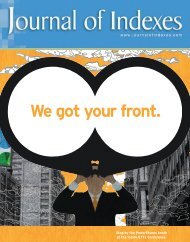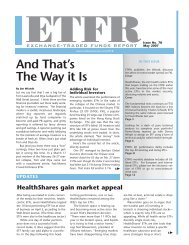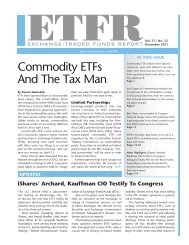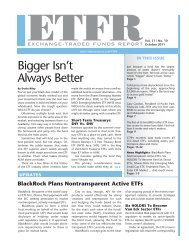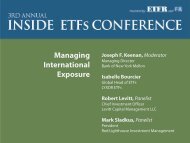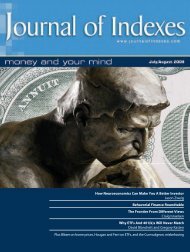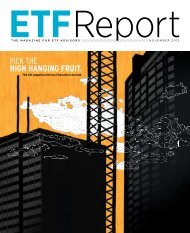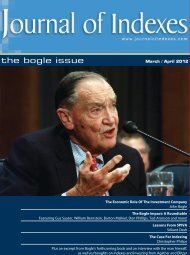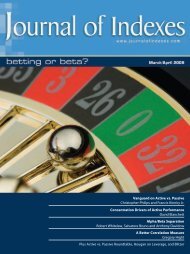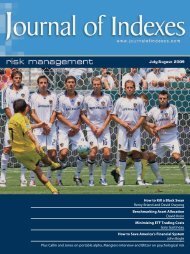US-Listed ETFs Sorted by Asset Class and Year-to-Date Return
US-Listed ETFs Sorted by Asset Class and Year-to-Date Return
US-Listed ETFs Sorted by Asset Class and Year-to-Date Return
You also want an ePaper? Increase the reach of your titles
YUMPU automatically turns print PDFs into web optimized ePapers that Google loves.
UPDATES<br />
Both CSMA <strong>and</strong> the double-exposure<br />
CSMB are based on an index that uses a<br />
quantitative methodology <strong>to</strong> track a dynamic<br />
basket of securities held as long<br />
or short positions <strong>and</strong> cash.<br />
The leveraged CSMB has an annual<br />
expense ratio of 0.55 percent, the same<br />
price as CSMA.<br />
Van Eck Launches<br />
Competing Colombia ETF<br />
Van Eck launched an equities ETF focused<br />
on Colombia, South America’s<br />
second-largest country, in mid-March.<br />
The Market Vec<strong>to</strong>rs Colombia ETF<br />
(NYSE Arca: COLX) competes directly with<br />
Global X Funds’ two-year-old Global X<br />
FTSE Colombia 20 ETF (NYSE Arca: GXG),<br />
but COLX is the cheaper of the two funds.<br />
COLX has an annual expense ratio of 0.75<br />
percent compared with GXG’s recently<br />
lowered net expense ratio of 0.78 percent.<br />
COLX, which tracks the Market Vec<strong>to</strong>rs<br />
Colombia Index, is designed as a<br />
“pure-play” exposure <strong>to</strong> companies either<br />
headquartered in Colombia or that<br />
derive most of their revenue from Colombia.<br />
Nearly a quarter of the mix is<br />
allocated <strong>to</strong> companies listed outside of<br />
Colombia that have significant business<br />
in the country. In addition, the ETF’s<br />
benchmark limits any one position <strong>to</strong> 8<br />
percent of the fund in an effort <strong>to</strong> keep<br />
the portfolio diversified <strong>by</strong> sec<strong>to</strong>r <strong>and</strong><br />
market capitalization, Van Eck said.<br />
Colombia has benefited from strong<br />
commodities price trends, solid exports<br />
<strong>and</strong> better access <strong>to</strong> credit in recent<br />
years, thanks <strong>to</strong> government policies<br />
that have opened up the country <strong>to</strong> foreign<br />
investment <strong>and</strong> allowed it <strong>to</strong> realize<br />
strong economic growth, a Van Eck<br />
representative noted.<br />
New IndexIQ ETF<br />
Tracks Ag Small-Caps<br />
IndexIQ rolled out a global agribusiness<br />
ETF on March 22 designed <strong>to</strong> tap in<strong>to</strong><br />
rising food prices <strong>and</strong> the alternative energy<br />
s<strong>to</strong>ry through a small-cap security.<br />
The IQ Global Agribusiness Small<br />
Cap ETF (NYSE Arca: CROP) joins Van<br />
Eck’s $3.8 billion, large-cap-focused<br />
Market Vec<strong>to</strong>rs Agribusiness ETF (NYSE<br />
Arca: MOO). CROP costs 0.75 percent,<br />
while MOO costs 0.56 percent.<br />
IndexIQ said the two funds have little<br />
overlap, with CROP’s portfolio focused on<br />
smaller companies in crop production,<br />
supplies <strong>and</strong> logistics, while MOO’s owns<br />
larger companies that are in the agricultural<br />
chemicals <strong>and</strong> operations sec<strong>to</strong>rs.<br />
CROP caps each sec<strong>to</strong>r allocation at<br />
25 percent of the portfolio. It owns securities<br />
from some 14 countries <strong>to</strong> maximize<br />
diversification. Its <strong>to</strong>p holdings<br />
at launch included Canada’s Viterra,<br />
the U.S.’ Trac<strong>to</strong>r Supply, Netherl<strong>and</strong>sbased<br />
Nutreco, Spain’s Ebro Foods <strong>and</strong><br />
Brazil’s Cosan.<br />
WisdomTree Debuts<br />
Asian Bond ETF<br />
WisdomTree Investments debuted an<br />
actively managed Asia ex-Japan bond<br />
fund denominated in local currency in<br />
mid-March.<br />
The WisdomTree Asia Local Debt<br />
Fund (NYSE Arca: ALD) will cast a wide<br />
net, covering China, Hong Kong, India,<br />
Indonesia, South Korea, Malaysia, Philippines,<br />
Singapore, Taiwan, Thail<strong>and</strong>,<br />
Australia <strong>and</strong> New Zeal<strong>and</strong>. The fund<br />
categorically excludes Japan, while Vietnam’s<br />
poor fundamentals mean that it<br />
didn’t make the cut for inclusion.<br />
ALD doesn’t use a benchmark;<br />
rather, its constituents are chosen <strong>by</strong> a<br />
WisdomTree investment committee focused<br />
on a number of parameters in a<br />
given country, including liquidity, debt<strong>to</strong>-GDP<br />
ratio, foreign reserves, inflation<br />
<strong>and</strong> unemployment.<br />
ALD has an expense ratio of 0.55<br />
percent.<br />
Schwab Plans To<br />
Use <strong>ETFs</strong> In 401(k)s<br />
Charles Schwab plans <strong>to</strong> lower 401(k) costs<br />
<strong>by</strong> steering assets, for the first time, <strong>to</strong>ward<br />
lower-priced passive index funds <strong>and</strong> <strong>ETFs</strong>,<br />
beginning this year. Should Schwab’s plan<br />
gain traction, it could seriously upset the<br />
world of defined-contribution retirement<br />
plans that’s dominated <strong>by</strong> actively managed<br />
mutual funds.<br />
The San Francisco-based company,<br />
which has a long-st<strong>and</strong>ing reputation as a<br />
discount broker <strong>and</strong> purveyor of low-cost<br />
funds, plans <strong>to</strong> begin rolling out the index<br />
mutual fund piece of its plan later this year,<br />
while the ETF portion will come <strong>to</strong> market<br />
sometime in 2012, a Schwab representative<br />
said. The company already runs about<br />
$200 billion in retirement assets.<br />
Schwab’s push is based on a study it<br />
published in September 2010 called “The<br />
New Rules of Engagement for 401(k)<br />
Success” that found that high costs <strong>and</strong> a<br />
lack of inves<strong>to</strong>r education have <strong>to</strong>gether<br />
conspired <strong>to</strong> limit the amount people<br />
save for their retirements, according <strong>to</strong><br />
the Schwab representative.<br />
EGPT Creations Resume<br />
Van Eck Global resumed creations of its<br />
Market Vec<strong>to</strong>rs Egypt Index ETF (NYSE<br />
Arca: EGPT) after the Egyptian exchange<br />
reopened on March 23. The New Yorkbased<br />
company halted creations in late<br />
January amid turmoil in the North African<br />
country that led <strong>to</strong> the closure of<br />
the Egyptian S<strong>to</strong>ck Exchange.<br />
The firm originally halted creations<br />
on EGPT on Jan. 31, during the unrest<br />
that hobbled daily life in Egypt <strong>and</strong><br />
ultimately led <strong>to</strong> the end of President<br />
Hosni Mubarak’s 30-year rule there.<br />
Throughout the seven-week episode,<br />
redemptions were still possible, Van<br />
Eck stressed in its prepared statement.<br />
At the close on March 22, EGPT was<br />
trading at a 12.8 percent premium <strong>to</strong><br />
its net asset value, or NAV, according <strong>to</strong><br />
data compiled <strong>by</strong> IndexUniverse.<br />
The Q’s Lose A ‘Q’<br />
Invesco PowerShares changed the ticker<br />
symbol on its popular Nasdaq-100 ETF,<br />
the PowerShares QQQ Trust (Nasdaq<br />
GM: QQQ) <strong>to</strong> “QQQ” from “QQQQ” so<br />
that the fund’s name matches its ticker.<br />
The change became effective on<br />
March 23, 2011. PowerShares emphasized<br />
in a prepared statement that everything<br />
else about the funds would<br />
remain exactly the same, including its<br />
listing on the Nasdaq exchange.<br />
The “Q’s,” as it is called <strong>by</strong> ETF industry<br />
insiders, had turnover of almost $1.052<br />
trillion in all of 2010, making it the thirdmost-liquid<br />
fund in the U.S. ETF universe<br />
after the large-cap SPDR S&P 500 ETF<br />
(NYSE Arca: SPY) <strong>and</strong> the small-cap iShares<br />
Russell 2000 Index Fund (NYSE Arca:<br />
IWM), according <strong>to</strong> data compiled <strong>by</strong> IndexUniverse.<br />
It had assets of nearly $23<br />
billion when the change <strong>to</strong>ok effect. <br />
4 ETFR • May 2011



